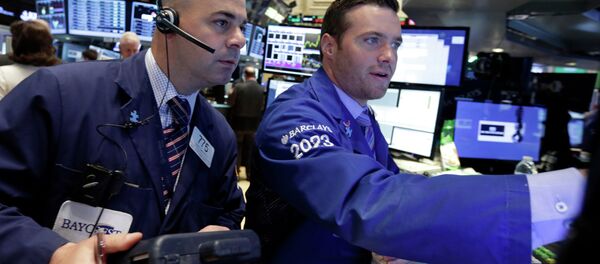Kristian Rouz – As the dollar has renewed its rally against other major currencies on the improved US macroeconomic outlook, hitting its nearly 8-year highest against the yen, most central banks across the globe see the situation as a blessing for their respective economies as rendering local exports more competitive worldwide.
Asian shares slipped on Wednesday with the Korean stock market posting its greatest losses in over four months. MSCI’s broader index of APEX shares outside Japan sagged 0.8%, while Australia’s S&P/ASX 200 Index shed 0.8%, Hong Kong’s Hang Seng retreated 0.6%.
In mainland China, the Shanghai Composite Index lost 1.1% during the day, rebounding, however, 0.2% at the close. Chinese stocks have been among the world’s best performers recently as the Communist nation’s faltering economy is constantly fueling expectations of more concessions from Beijing regarding monetary policies and the overall economic liberalization.
As mainland’s regulators have taken cautiously gradual steps towards looser monetary policies by allowing more renminbi liquidity in the economy during past several months, the recent pledge of more openness before foreign capital propelled Chinese to their 7-year highest on Tuesday.
In South Korea, the Kospi Index crashed 1.7% towards Wednesday’s close in its biggest decline since January due to concerns related to economic growth. HSBC downgraded its outlook on Korea’s growth to 2.8% for 2015 from the previous estimate of 3.1% earlier on Wednesday, triggering a selloff of the local currency. The won slid 0.4%.
As stated by HSBC, Korean exporters will inevitably suffer a decline in sales due to the ongoing slump of mainland China’s effective demand for Korean-made goods. However, a weaker won and a stronger dollar are likely to spur demand for Korean cars and electronics in the States, possibly replacing the Chinese demand. This year, the Kospi Index rose 12% as the US are moving toward economic normality.
Japanese exporters gained greatly. Shares of Fuji rose 4.3%, while the car-maker Mazda added 1.4%. However, minutes from Bank of Japan limited the Japanese stock rally as some policy-makers feel the actual inflation will be weaker than the government’s target through to 2017.
In Europe, stocks gained as Greek concerns faded after the indebted nation’s PM Alexis Tsipras reconfirmed his commitment to reach a compromise deal with international creditors despite the protests of some left-wing radicals of his party, Syriza. The Stoxx Europe 600 Index rose 0.53%, while the English FTSE 100 Index added 0.63%, the German DAX Index rose 0.14% and the French CAC 40 added 0.44%.
The common currency slumped against the dollar second day straight, —02% to $1.0890, heading for its one-month lowest of $1.0864. In the export-reliant Germany, the economic sentiment has improved due to the dollar’s renewed strength.




